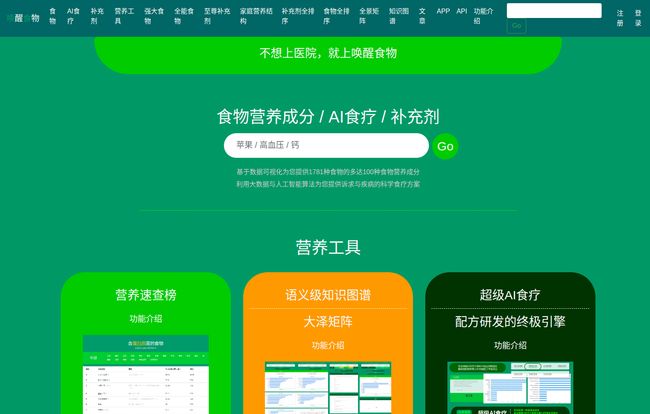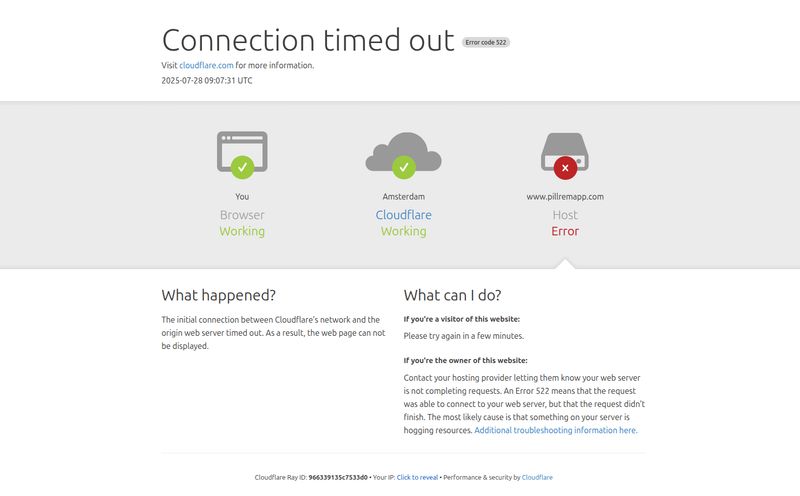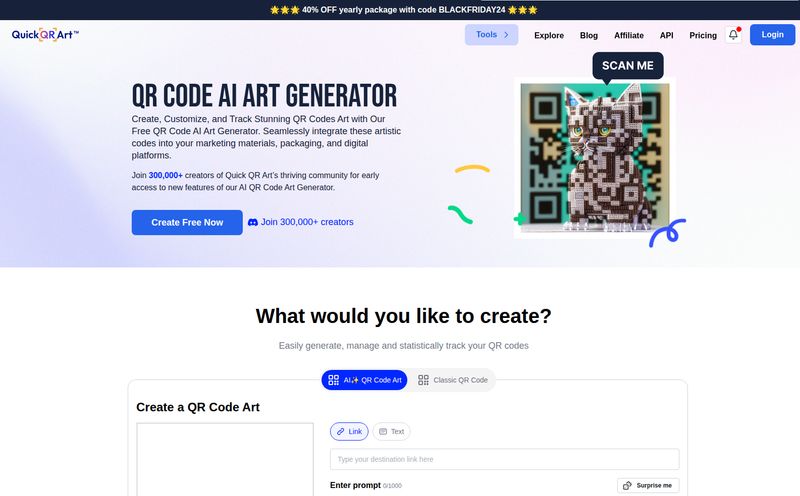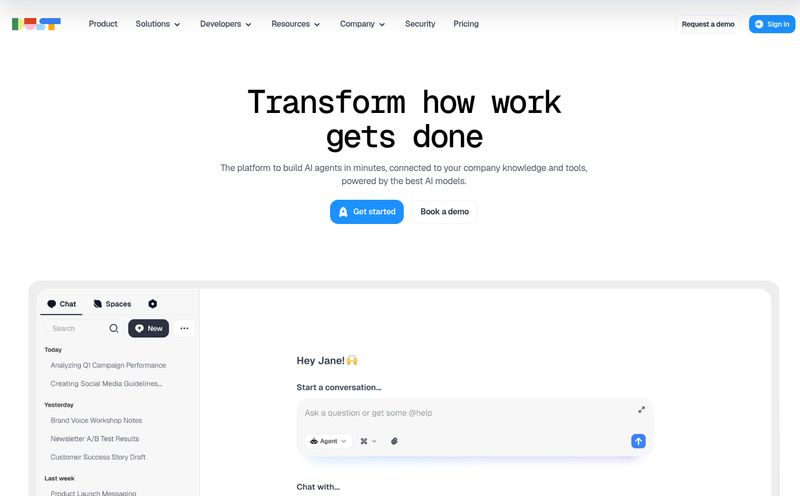As someone who lives and breathes SEO, I've seen the health and wellness niche become an absolute battlefield. You're fighting against huge authority sites, questionable 'gurus', and an endless stream of content that all says the same thing. Finding a unique angle, let alone genuinely helpful, data-backed information, can feel like trying to find a needle in a haystack. A very, very large haystack.
So, when a new tool pops up on my radar that mashes together AI, a massive food database, and even traditional Chinese medicine, my curiosity gets the better of me. The tool is called 唤醒食物 (Waking Food), and it’s one of the more interesting platforms I’ve stumbled upon this year. It's not just another calorie counter. This thing aims to be a full-blown dietary therapy engine. And my first thought wasn't just, "Could this help my diet?" It was, "Could this be a content goldmine?"
So, What Exactly is Waking Food?
At its core, Waking Food is an AI-powered platform from China designed to give you hyper-detailed nutritional information and dietary plans. Forget generic advice. This platform claims to build its recommendations on a mountain of data, including scientific literature from PubMed, and classical texts. It’s trying to bridge the gap between modern data science and ancient wisdom. It's an ambitious idea, I'll give it that.
The entire interface is built around data visualization. Think colorful charts and direct comparisons, making complex nutritional science feel a bit more... digestible. Pun absolutely intended. The goal is to arm you with reliable knowledge so you can make long-term health gains. Not just a quick fix.

Visit 唤醒食物 (Waking Food)
A Look Under the Hood at The Main Features
When you start poking around, you see it's more than just a search bar for vitamins. It's a whole suite of tools. Some might argue its a bit much, but I appreciate the scope.
AI-Powered Dietary Therapy
This is the main event. You can get AI-generated dietary therapy plans for different health conditions. The platform cross-references symptoms and goals with its database of foods, nutrients, herbs, and extracts. It's like having a robot nutritionist who has read thousands of studies and ancient scrolls. The potential here is pretty staggering, especially for creating highly specific content.
The Massive Food Database
We're talking about a seriously huge amount of information. The site boasts over 600 million data points covering more than 1,280 nutrients. You can look up pretty much any food and get a complete breakdown of its nutritional components. For a data geek like me, this is heaven. It's the kind of raw information that can fuel dozens of articles, infographics, and social media posts.
Food Geeks Rejoice with Comparison and Ranking Tools
Here’s where it gets fun. Waking Food has tools that let you compare foods side-by-side. Wondering if spinach or kale really has more iron per serving? You can check. It also has ranking lists for foods based on specific nutrients. This is SEO 101, right? "Top 10 Foods Highest in Vitamin C" type articles could be researched here in minutes, and you'd have the data to back it up.
A Nod to Tradition with TCM Integration
One of the most unique aspects is its inclusion of Traditional Chinese Medicine (TCM) principles. It offers insights on foods based on their properties in TCM, like whether they are 'warming' or 'cooling'. This is a fascinating layer that you just don't see in Western-centric health apps. It opens up a whole new dimension for content and a completely different audience segment.
The Good, The Bad, and The Data-Driven
No tool is perfect, right? After spending some time with it, here’s my honest take. It’s not all sunshine and kale smoothies.
What I'm Really Liking
The commitment to scientific data is a huge plus. Grounding recommendations in PubMed research gives it a leg up on platforms that rely on anecdotal evidence. The user interface is also surprisingly clean and intuitive, especially given the sheer volume of data it's presenting. I also have to applaud the focus on natural solutions—nutrients, herbs, and food as medicine. And I love the blend of AI with TCM, it's a fresh perspective.
"The data is very detailed and practical, much better than some other software. I hope it gets better and better, and I will continue to support it." - A user testimonial from their site (translated).
Where It Gets a Bit Tricky
My biggest hesitation is the explicit exclusion of Western medicine from its dietary plans. While the focus on diet is great, it shouldn't exist in a vacuum. It feels like a missed opportunity to provide a truly holistic view. Also, its reliance on PubMed means it might exist in a bit of a data bubble, potentially missing out on other valuable research. And let's be real, with 600 million data points, information overload is a genuine risk for the average user. Finally, any AI is only as good as its data. If there are gaps or biases in the source informaton, the recommendations will reflect that.
The Big Question on Pricing
Here's the million-dollar question: what does it cost? As of my review, there’s no clear pricing page or subscription model visible on the site. It seems to be free to use, at least for now. This could be a launch strategy to build a user base before introducing a freemium or paid model. For now, you can jump in and start playing around without pulling out your credit card, which is always a bonus.
An SEO's Perspective on Traffic Generation
Alright, let's put our marketing hats on. How can we use a tool like this? I see a few massive opportunities.
- Hyper-Specific Content Creation: Instead of another generic "Benefits of Blueberries" post, you could write "A Data-Backed Look at Blueberry vs. Acai for Antioxidant Levels." Use the comparison tool, pull the numbers, and create something with real substance.
- Niche Site Fodder: Building a site around a specific dietary need or condition? This tool could be your research department. You can generate endless topic ideas and back them with specific data points about foods, supplements, and herbs.
- E-E-A-T and Topical Authority: In the age of Google's Experience, Expertise, Authoritativeness, and Trustworthiness (E-E-A-T), showing your work is everything. Citing data from a tool that references PubMed is a powerful way to build credibility. You can build out topic clusters around nutrients or health goals, making your site a go-to authority.
Basically, it’s a shortcut to the kind of data-rich content that can perform really well in competitive health SERPs. It helps you move beyond just talking about health to actually demonstrating it with numbers and science.
Frequently Asked Questions
- What is Waking Food (唤醒食物)?
- It's an AI-driven website that provides detailed food nutrition information and dietary therapy plans based on scientific research and Traditional Chinese Medicine.
- Who is this platform for?
- It's for anyone interested in a data-deep approach to nutrition, from health-conscious individuals and biohackers to content creators and SEOs in the wellness niche.
- Is Waking Food based on credible science?
- It heavily relies on data from PubMed, a highly respected database of biomedical literature. However, it also incorporates principles from Traditional Chinese Medicine, which may be viewed differently depending on your perspective.
- Is Waking Food free to use?
- Currently, it appears to be free. There is no pricing or subscription information available on the website, so you can access its features without payment for now.
- Is Waking Food available in English?
- No, the website and its tools are currently only available in Chinese. You'll need to use a browser's translation feature to navigate it if you don't read the language.
My Final Thoughts
So, is Waking Food a perfect tool? No. The exclusion of Western medicine and the potential for a data echo chamber are valid points of concern. But is it a fascinating, powerful, and potentially game-changing platform for health content creators? Absolutely.
It represents a shift towards more data-transparent health information. It gives us the raw materials to build content that is genuinely helpful, deeply researched, and unique. Even with its quirks, Waking Food is a tool I’ll be keeping a very close eye on. It’s a glimpse into a future where AI and ancient wisdom aren't opposed, but work together to help us all live a little healthier.
Reference and Sources
- Waking Food Official Website: www.foodwake.com
- PubMed Database: pubmed.ncbi.nlm.nih.gov



